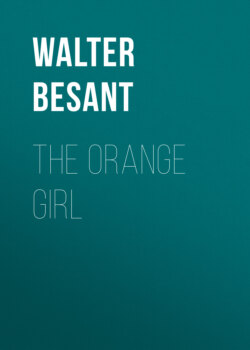Читать книгу The Orange Girl - Walter Besant - Страница 11
На сайте Литреса книга снята с продажи.
"'GIVE UP!' HE CRIED, GROWING PURPLE IN THE FACE."
ОглавлениеTable of Contents
'Give up?' cried my uncle. 'Is the boy mad? Give up his prospects in this House—this—the soundest House in the whole City? Nephew Will, wouldst starve?'
'I will make a living by music.'
'Make a living—a living—make a living—by music? What? To play the fiddle in a tavern? To play in the gallery while your father is feasting below?'
'Nay, sir; but there are other ways.'
'Hark ye, Will; let this stop. Back to thy desk lest something happen.' My father spoke with sudden sternness.
'Nay, sir; but I am serious.'
'Ay—ay? Serious? Then I am serious, too. Understand, then, that I own no son who disgraces the City family to which he belongs by becoming a common musician. Choose. Take thy fiddle and give up me—this office—thine inheritance—thine inheritance, mind, or lay down the fiddle and go back to thy desk. There, sir, I am, I hope, serious enough.'
He was. My father was a masterful man at all times; he was perfectly serious. Now the sons of masterful men are themselves often masterful. I walked out of the counting-house without a word.
I am conscious that there is no excuse for a disobedient son. I ought to have accepted any orders that my father might choose to lay upon me. But to part with my fiddle, to give up music: to abandon that sweet refreshment of the soul: oh! it was too much.
Moreover, no one knew better than myself the inveterate hatred with which my father and the whole of my family regarded what they called the tinkling cymbal which they thought leads souls to destruction. Had I seen any gleam of hope that there would be a relenting, I would have waited. But there was none. Therefore I cast obedience to the winds, and left the room without a word.
Had I known what awaited me: the misfortunes which were to drag me down almost unto a shameful death, in consequence of this act of disobedience, I might have given way.
But perhaps not: for in all my troubles there were two things which cheered and sustained me, I enjoyed at all times, so you shall learn, the support of love and the refreshment of music.
Had my father known of these misfortunes would he have given way? I doubt it. Misfortune does not destroy the soul, but music does. So he would say and so think, and conduct his relations with his own accordingly.
I walked out of the counting-house. At the door I met, face to face, the informer, my cousin Matthew, who had caused all this trouble.
He was attired as becomes a responsible merchant, though as yet only a clerk or factor with the other clerks. He wore a brown coat with silver buttons: white silk stockings: silver buckles in his shoes: silver braid upon his hat: a silver chain with seals hanging from his fob: with white lace ruffles and neckerchief as fine as those of his father, or of any merchant on Change.
He met me, I say, face to face, and for the first time within my knowledge, he grinned when he met me. For he knew what had been said to me. He grinned with a look of such devilish glee that I understood for the first time how much he hated me. Why? I had never crossed him. Because I was the son of the senior partner whose place I was to take and of the richer man of the two Partners. His would be the subordinate position with a third only of the profits. Therefore my cousin hated me. He, I say, noted my discomfiture. Now, at that moment, I was in no mood for mockery.
Something in my face stopped his grinning. He became suddenly grave: he dropped his eyes: he made as if he would pass by me and so into the house.
'Villain and maker of mischief!' I cried. Then I fell upon him. I had but fists: he had a stick: I was eighteen: he was five-and-twenty: he was heavier and taller: well; there is little credit, because he was a poor fighter: in two minutes I had his stick from him, and in three more I had broken it over his head and his shoulders. However, had his wind and his strength equalled his hatred and desire that the stick should be broken over my shoulders instead of his, the result would have been different.
'You shall pay—you shall pay—you shall pay for this,' he gasped, lying prostrate.
I kicked him out of my way as if he had been a dog and strode off, my cheek aflame, my hand trembling and my limbs stiffened with the joy of the fight and the victory. Come what might, I had whipped my cousin, like the cur he was. A thing to remember.
I have never repented that act of justice. The memory of it brought many woes upon me, but I have never repented or regretted it. And certain I am that to the day of his miserable death Matthew never forgot it. Nor did I.
